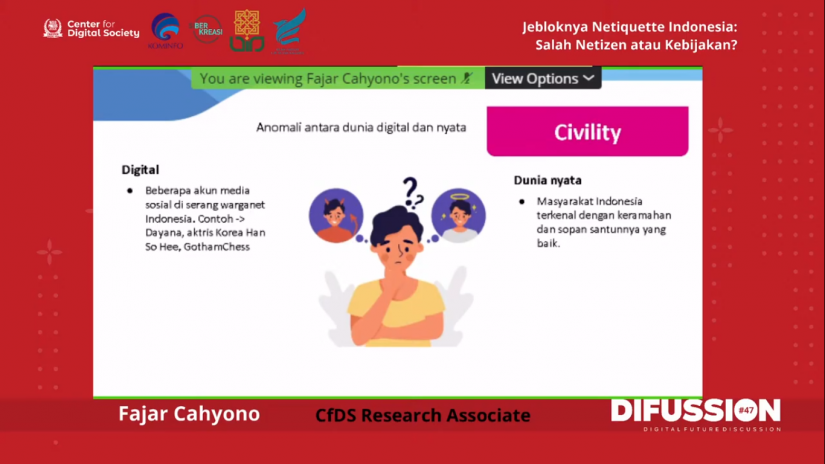
Yogyakarta, April 16th 2021 – Center for Digital Society (CfDS) and DEMA FISHUM UIN Sunan Kalijaga together held Difussion #47 on Friday afternoon (16/4). The event was titled as “The Fall of Indonesian Netiquette: Who is Wrong, Netizens or Policies?” presented two speakers, Ndoro Kakung (Social Media Practitioner) and Fajar Cahyono (Research Associate of CfDS). This discussion was moderated by Fununun Nisha, this event aired on Zoom Meeting and YouTube Live. This Digital Future Discussion talked about how bad the netiquette of netizens on the internet is. Research results of Microsoft stated that the digital activity level of Indonesian netizens was down from 8 to 76 compared to last year and placed Indonesia in the last position in Southeast Asia. This research was done in 32 countries with more than 16,000 respondents. In this case, the ethics of Indonesian netizens in social media is very questionable. “In this way, we as Indonesian netizens are the most disrespectful people in Southeast Asia,” Fajar Cahyono said. There are several factors that caused Indonesia’s position to go down compared to last year. Among them, the hoax and fraud rates increased by 13 points to 47%, hate speech increased by 5 points to 27%, and discrimination decreased by 2 points to 13%. This condition is of course very concerning, considering that Indonesian people are known for their hospitality and good manners. However, this is the opposite on the digital world, netizens tend not to present Indonesian culture. Oftentimes we see Indonesian citizens acting aggressively and speaking inappropriately on social media. For example, several social media accounts that were attacked by Indonesian netizens, such as Dayana, Korean actress Han So Hee, GothamChess, etc.

Responding to this, Fajar Cahyono suggested not to partially capture the research that was published by Microsoft. Moreover, if we understand the research as a whole, the methodology used is non-probability sampling which only applies to the people surveyed and cannot be generalized. Thus, further research is needed to strengthen the results.
“Hopefully we are not too responsive and do not overly affirm what Microsoft said because the methodology cannot be generalized,” Fajar Cahyono said. Fajar also said that actually there are normative rules in the form of the ITE Law (UU ITE), but none of them specifically regulate the direction for digital literacy where this should be made into a national program. The challenge of digital literacy is not only the ability of users but also contains Indonesia’s digital literacy roadmap. Ndoro Kakung conveyed that there are four things that must be understood as digital literacy. Among them; social media skills, knowing social media culture, understanding digital ethics, and having knowledge about digital security.
“With these four skills, it is hoped that the digital literacy program will be achieved and effective and citizens will become more civilized, polite, knowledgeable, and safe in using the internet and social media,” Ndoro Kakung said.
